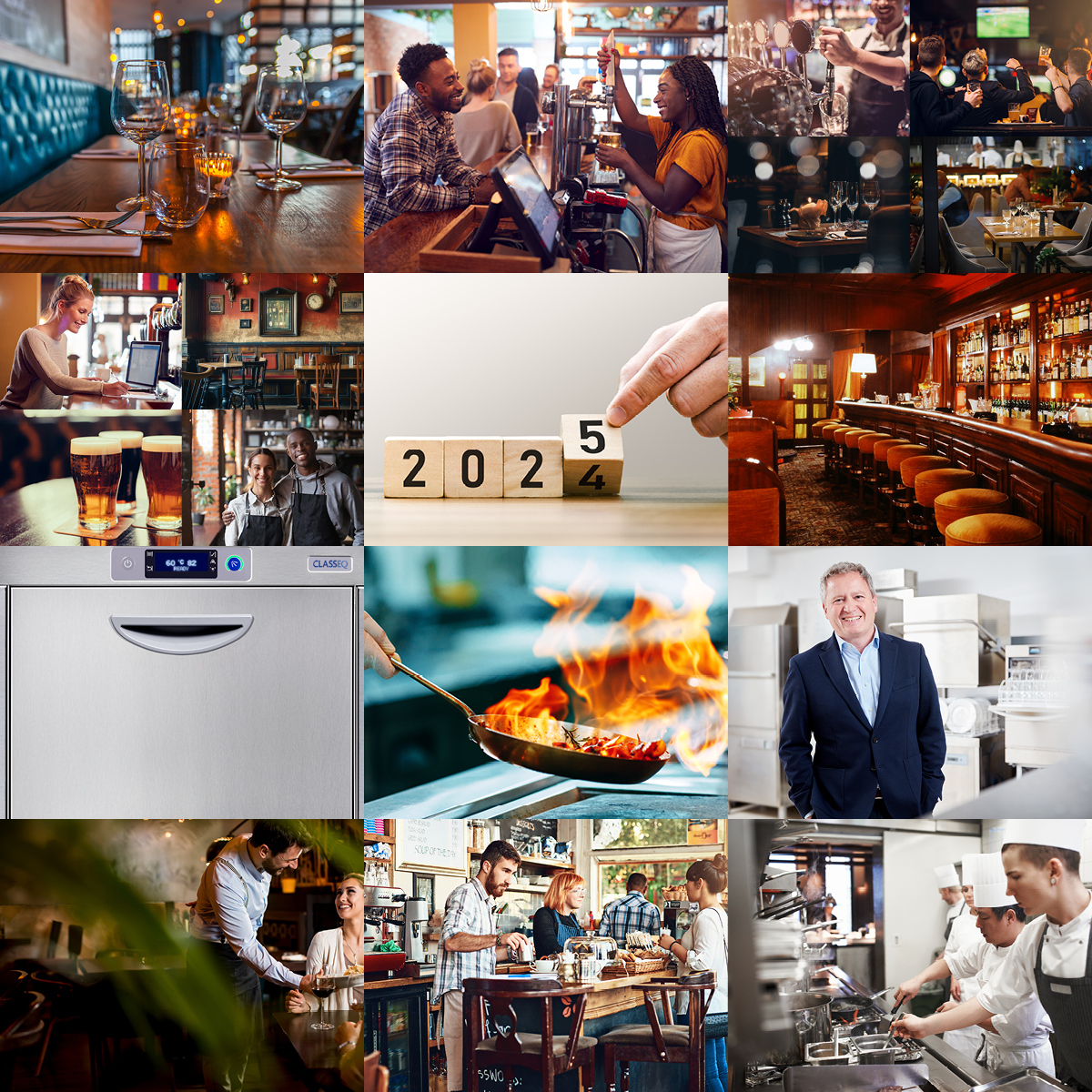
17 Dec 2024

The catering and hospitality industry has been hit hard in recent years. And whilst we all acknowledge the choppy waters, there is an air of optimism within the sector.
Recent news reports that the UK’s top restaurant groups have returned to profitability after 4 years of losses – albeit marginal. It was also reported that UK pubs and restaurants were able to toast a surge in business during the festivities. But as the articles suggests, we’ve still got some way to go yet.
As an industry, we’re a major contributor to the economy. With 2.9 million people employed across the industry and generating £130bn, hospitality is the 3rd largest private sector employer in the UK.
So we’re all aware of the need to constantly adapt, meeting the ever increasing demands and desires of customers. It’s this flexibility and creativity that will see many fight back stronger than ever.
So, the big question is… what will 2023 look like for the catering and hospitality sector, and what should we prepare for?
Employee retention and care
The hospitality industry is known for facing a range of staffing challenges. It’s a tough industry to be in at the best of times. The long hours, late nights, early mornings, and the general public (who can be unpredictable).
The pandemic and other UK and global current events have also brought new challenges to the industry, such as the staffing shortages and increased costs.
But, while we exist to look after and cater to others, we should include our own staff in that approach too. Not just when finding great people becomes a challenge, but always. Hospitality businesses know the problems that arise from high staff turnover, and are placing an emphasis on employee retention and development, focusing on creating environments that promote better wellbeing, physically and mentally.
With an increasing demand for high-quality and sophisticated food, a shortage of skilled staff can lead to increased costs and a decline in the quality of service and output. This can lead to damaged reputation, decreased footfall, and dissatisfied customers. All of which are incredibly detrimental to a business operating in this sector.
But these things can be eased. It’s important to find ways to retain the staff that you have trained and integrated into your business already. What will make them happier in their role? It is not always money either. Ideas that can help retain your staff may include:
Personal development
Create opportunities to meet with your team. It’ll build a rapport, trust and enable you both to address challenges. It will also enable you to create tasks that individuals can become accountable for, giving them a strong sense of responsibility within the team that can be monitored and rewarded.
Identify areas where additional training could be required or desired.
Look at platforms that can offer perks, recognition and rewards that not only offer discounts at high street stores to help with the cost of living but will also help with physical and mental well-being.
Identify opportunities for career progression. Opportunities that may be available within the business already or can be created for the benefit of the individual and the business.
Team Engagement
Create the time for regular development discussions, involving all areas of the business and the management. This will foster a feeling of involvement and inclusion. Organise ideation sessions or idea/suggestion boxes for staff, teams, and management to engage everyone and build a strong team spirit. Ideas that implemented could be rewarded.
Wellbeing support
As we’ve mentioned above, this sector can be extremely stressful. How can you acknowledge and support the physical and mental wellbeing of your team. There are platforms such as Perkbox that can offer this type of support for a small monthly subscription for all staff.
Flexibility and Facilities
Sometimes change is a good thing. Are there better ways of operating that will ‘mix things up” for your teams.
Could better operating equipment support their role within the business much better and create new efficiencies.
Social Responsibilities
Choose a local charity to support that everyone can get behind. Not only will this create team engagement it will gather external support in your local area while all the time you are doing good for your external community.
You may even find that carrying out exit interviews when people do leave will give you great insights into what can be done to retain your staff longer. Remember, nothing lasts forever, but longer lasting relationships with your team can really pay dividends for your business and customer experiences.
Find out what works for your business and your team.
Flexibility of service
Many bars and restaurants are adapting their environment, menus and service style. Some are focusing on the transition from a relaxed daytime vibe to an alternative evening vibe which allows them to capture a wider range of demographics throughout the day.
This transition might include a new style of lighting, music, a more nuanced menu including cocktails, or a more stylish offering for the night-time crowds. Whatever suits your establishment and the audience, a transition can keep the same customers in your venue for longer or have them returning for cocktails hours after they’ve enjoyed a morning coffee.
Some venues can transition to accommodate two unique audiences without either being aware of the other.
By remaining adaptable in your space, and being flexible with your operations and your offerings, you can stay relevant, and meet a more diverse range of customer expectations.
Provenance and Sustainability
Sustainability is a topic that is becoming ever increasingly important to customers within their day-to-day activities and is certainly playing a part in the decision-making when it comes to choosing places to visit for food and drink.
Equally many businesses are actively looking to reduce their environmental impact. From recycling and reducing waste, sourcing from local and sustainable suppliers to improve their supply chain issues, to the efficiencies of their machinery and appliances. New processes for recycling are being implemented by businesses to avoid waste across the business and proper service and maintenance plans to help the longevity and efficiency of machines operating.
We’ve seen in recent news that even the largest food corporations in the world are swapping to reusable take away packaging. Whilst it is good for the environment, it’s also good for the businesses and is becoming more of a consideration for the customer.
A focus on provenance also supports a health and wellness message. If businesses know their supply chain well, they can be more confident in the options they offer as being healthy and sustainable. This is not only a more sustainable practice but there is an emotional tie in from customers because they’re aware of the positive impact of locally sourcing ingredients and products.
Whatever steps a business takes, every little action goes a little way to help the environment and improve the businesses credentials.
The use of Tech: Personalisation and Automation
Today, customers in almost all sectors expect a more personalised service. We all want to feel like the service we receive is tailored to our specific needs and preferences. Imagine if every bar and restaurant treated you as your local does.
A huge 80% of customers are interested in some kind of personalised engagement from the venues they visit.
The potential of technology to create personalised experiences is vast and starts at the initial enquiry stage. Website chatbots, online/mobile booking functionality, suggested menus, discount codes, promotions, suggested dinner dates, virtual concierge and welcome messages prior to arrival all help to deliver a more personalised experience to a guest, strengthening relationships and promoting better customer loyalty. Introducing technology also allows a business to gather data on their customers. This helps catering and hospitality businesses better manage their resources, increase customer engagement and maintain communication with a customer even after they’ve settled the bill.
As we look forward to 2023, the vision for the catering and hospitality industry, from many sources, is an optimistic one of continued growth and innovation.
Businesses should always focus on offering exceptional customer service and unique dining and drinking experiences. We’re all fighting for that differentiator within a competitive market. And we’ve come to accept that we now live in a digital world where very often, a buying decision is made before the customer has even stepped foot into your premises. So, technology will continue to play a significant part in streamlining operations and enhancing the customer experience.
As we said, the last few years have been unpredictable. So we’d be naïve to try and predict the next 12 months but one thing is for sure, businesses in the catering and hospitality industry need to be alert, responsive and adaptable to many more challenges.
At Classeq, we are passionate about the growth and success of the hospitality sector. That’s why we are committed to providing you with content that explores every juncture of the hospitality journey from the distribution of catering equipment right through to the patron’s plate.
If there is a topic you’d like us to explore further, do let us know. Otherwise, view our full content library here, or speak to a member of the team today . Whether it’s a new machine you need, or technical support, our team is ready to assist.
Sources:
Big Hospitality – Welcome surprise as UK top restaurant groups return to profitability
UK Hospitality – https://www.hospitalitynet.org/organization/17015097.html
Waste Dive –https://www.wastedive.com/news/pepsico-double-reusable-packaging-goal-2030/638070/
Big Hospitality – Personalisation is a valuable revenue booster for hospitality businesses
You have questions or need help?
We'll call you or write to you!